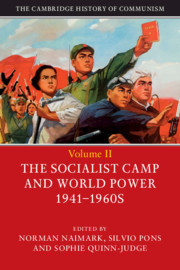The Cambridge History of Communism The Cambridge History of Communism 3 Volume Paperback Set Series
Langue : Anglais
Coordonnateurs : Naimark Norman, Pons Silvio, Quinn-Judge Sophie

Explores the creation of a Eurasian bloc of Communist nations after World War II, and the influence of Communist movements.
The second volume of The Cambridge History of Communism explores the rise of Communist states and movements after World War II. Leading experts analyze archival sources from formerly Communist states to re-examine the limits to Moscow's control of its satellites; the de-Stalinization of 1956; Communist reform movements; the rise and fall of the Sino-Soviet alliance; the growth of Communism in Asia, Africa and Latin America; and the effects of the Sino-Soviet split on world Communism. Chapters explore the cultures of Communism in the United States, Western Europe and China, and the conflicts engendered by nationalism and the continued need for support from Moscow. With the danger of a new Cold War developing between former and current Communist states and the West, this account of the roots, development and dissolution of the socialist bloc is essential reading.
Introduction Norman Naimark, Silvio Pons and Sophie Quinn-Judge; Part I. Expansion and Conflict: 1. World War II, Soviet power and international communism Evan Mawdsley; 2. Anti-fascist resistance movements in Europe and Asia during the Second World War Alfred Rieber; 3. The Sovietization of East Central Europe, 1945–1989 Norman Naimark; 4. The Chinese Communist Revolution and the world Chen Jian; 5. Nikita Khrushchev and de-Stalinization in the Soviet Union 1953–1964 Joerg Baberowski; 6. The changing pattern of Soviet-East European relations, 1953–1968 Mark Kramer; 7. Reform undercurrents and the Prague Springs Pavel Kolar; 8. The socialist modernization of China between Soviet model and national specificity, 1949–1960s Thomas Bernstein; 9. The Chinese cultural revolution Andy Walder; 10. The rise and fall of the Sino-Soviet Alliance, 1949–1989 Sergey Radchenko; 11. Mao Zedong as a historical personality Daniel Leese 12. Cold War anti-communism and the impact on the West Federico Romero; Part II. Becoming Global, Becoming National: 13. Communism, de-colonization, and the Third World Andreas Hilger; 14. The Socialist camp and the challenge of economic modernization in the Third World Sara Lorenzini; 15. The Cuban Revolution: the first decade Piero Gleijeses; 16. Latin American communism Victor Figueroa Clark; 17. The history of the Vietnamese Communist Party (1941–1975) Sophie Quinn-Judge; 18. Korean communism: from Soviet occupation to Kim family regime Charles Armstrong; 19. Indonesian communism: the perils of the parliamentary path John Roosa; 20. Communism in India Hari Vasudevan; 21. Comparing African experiences of communism Allison Drew; 22. Communism in the Arab World and Iran Johan Franzén; 23. Yugoslav communism and the Yugoslav State Ivo Banac; 24. Italian communism Giovanni Gozzini; 25. The French Communist Party Marc Lazar; 26. American communism Phillip Deery; Index.
Norman Naimark taught at Boston University and was a Fellow of the Russian Research Center at Harvard University, Massachusetts, before moving to Stanford University, California, in 1988. At Stanford, he chaired the History Department, was Director of the Russian and East European Center, and directed a series of International Affairs organizations and programs. Previous works include The History of the 'Proletariat' (1979); Terrorists and Social Democrats (1983); The Russians in Germany (1997); Fires of Hatred (2002); Stalin's Genocides (2011); and, most recently, Genocide; A World History (2017). He is presently working on a book about Stalin's policies in Europe after World War II.
Silvio Pons is Professor of Contemporary History at the Università degli Studi di Roma 'Tor Vergata'. He is the President of the Gramsci Foundation in Rome and a member of the Editorial Board of the Journal of Cold War Studies. Recent publications include Stalin and the Inevitable War (2014); A Dictionary of Twentieth Century Communism (2010) and The Global Revolution. A History of International Communism (2014). He has extensively researched and written on the Cold War, the Soviet Union, European Communism, and global Communism.
Sophie Quinn-Judge is the author of Ho Chi Minh: The Missing Years (2002) and the forthcoming, The Third Force in Vietnam: The Elusive Search for Peace. She was Associate Professor of History and Associate Director of the Center for Vietnamese Philosophy, Culture and Society at Temple University before retiring in 2015.
Silvio Pons is Professor of Contemporary History at the Università degli Studi di Roma 'Tor Vergata'. He is the President of the Gramsci Foundation in Rome and a member of the Editorial Board of the Journal of Cold War Studies. Recent publications include Stalin and the Inevitable War (2014); A Dictionary of Twentieth Century Communism (2010) and The Global Revolution. A History of International Communism (2014). He has extensively researched and written on the Cold War, the Soviet Union, European Communism, and global Communism.
Sophie Quinn-Judge is the author of Ho Chi Minh: The Missing Years (2002) and the forthcoming, The Third Force in Vietnam: The Elusive Search for Peace. She was Associate Professor of History and Associate Director of the Center for Vietnamese Philosophy, Culture and Society at Temple University before retiring in 2015.
Date de parution : 04-2020
Ouvrage de 700 p.
15.3x22.8 cm
Date de parution : 09-2017
Ouvrage de 700 p.
15.7x23.5 cm
Thème de The Cambridge History of Communism :
© 2024 LAVOISIER S.A.S.



